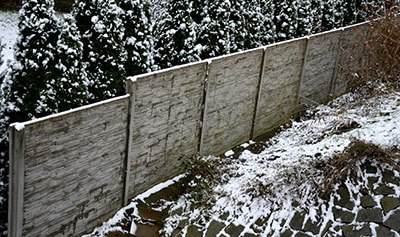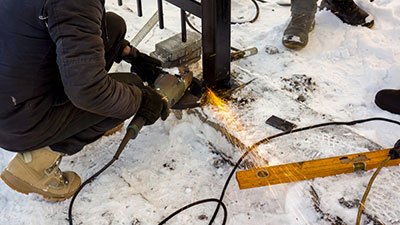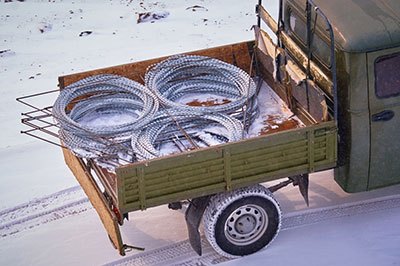Installing fencing in the winter can be a tricky decision with many pros and cons to think about. It isn’t as easy as it looks, especially when you factor in the heavy snows fall, freezing temperatures, and extreme weather conditions.
Not to mention, dealing with equipment in cold weather is never ideal because ice can cause major problems that delay the timing and completion of the job.
So if you’re trying to decide whether or not now is a good time to have your fencing installed – this post will help break down the upcoming challenges along with the potential advantages of taking on this project during the colder months.
It’s time we debunk some of the most common winter fence myths and see wheater cold affects fences or not!
Take away key points:
- Before installation, look for the best fence materials that can endure low temperatures and not make the winter fence brittle.
- If you are unsure of the actually installation process, it’s best to hire fencing contractors!
- Never try to install a fence in the frozen ground! it’s virtually impossible for you to accurately install the fence post when the temperatures drop below 25 degrees.
Table of Contents [show]
Is winter a good time for fence installation?
Installing a fence during the winter season can be challenging due to various factors, such as freezing temperatures, snow, and limited daylight.
However, with proper planning, preparation, and a few extra precautions, winter fence installation can be successful. It is important to consider the climate and weather conditions of your location, as well as the type of fence you want to install.
Some fence materials may not be suitable for winter installation and may require warmer temperatures to set properly.
Overall, while it may require more effort and patience, installing a fence during the winter season is possible.

Advantages of installing a fence in the winter
– Availability of fencing contractors: As the demand for fencing services is typically lower during the winter months, you may be able to find a fencing contractor more quickly and at a lower price.
– Quicker installation: Since the ground is often harder and more compact during the winter, it can be easier to install fences in some regions.
– Reduced lawn damage: With most plants dormant during the winter season, installing a fence is less likely to cause any damage to your lawn or landscaping.
– Improved privacy and security: Installing a fence during the winter season can give you instant privacy and security benefits, allowing you to enjoy your property without any worries.
– Future landscaping planning: By installing a fence in the winter season, you’ll have more time to plan and execute your landscaping plans for the spring, as the fence installation will already be done.
Overcoming weather constraints: Tips for installing fences in cold weather
Installing a fence in cold weather can seem daunting with potential weather obstacles like snow, sleet, and freezing temperatures. However, with the right tools and preparation, it is possible to carry out a successful installation.
Here are five tips to help you overcome weather constraints when installing a fence in cold weather:
– Choose your materials carefully: Some fencing materials, such as vinyl fence, aluminum, and chain-link, may be easier to install in cold weather. Others, like wood fence, may require special considerations such as pre-treating the wood or letting the fence panels acclimate to the colder temperatures.
– Prepare the ground: Ground conditions have a significant impact on fence installation. Ensure that the ground is firm and unfrozen, enabling the fence posts to be set firmly in place. The frozen ground will make it impossible to install plow markers or anything else for your DIY fencing jobs. Techniques such as using heated blankets and thawing the ground with heated water can be considered for an easier installation process.
– Set up a temporary windbreak: Setting up a windbreak surrounding the work area can help protect the construction site from harsh wind and other elements.
– Use the right tools: Since winter weather conditions can change unexpectedly, it’s important to have the right tools available for tough jobs. Essential tools include extra lighting, heaters, tarps, snowplows and shovels to help keep the work environment safe. Make sure you shovel snow before you start to install fencing.
– Hire a professional fence contractor: While you can save money by installing your fence in winter, it’s important to be aware of the risks and challenges that come with it. Consider consulting with a professional fencing contractor who has the experience and equipment necessary to manage the installation process in cold weather safely and to install an even and beautiful fence.
Choosing the right materials for winter fence installation

– Vinyl: Vinyl fence is a popular fencing material that has many benefits. It is weather-resistant, durable, and easier to install in cold climates since it does not require painting or staining, while the vinyl fencing maintenance is relatively low. Homeowners who opt for vinyl fencing system install, may also opt for springtime to install the new fence installation project, as this weather will bring less damaging impacts.
– Aluminum: Aluminum fencing is another great option for cold-weather fence project installation. It is lightweight and easy to install. It can also be customized to fit the homeowner’s design preferences.
– Chain-link: Chain-link is another versatile option that can be fence installed quickly in cold temperatures and weather conditions. It is an affordable solution that provides both security and visibility.
– Wood: Wood fences are a classic fencing option and can be used for winter fencing installation. However, it is important to choose pressure-treated wood that is designed to withstand freezing temperatures.
– Composite: Composite fencing is an eco-friendly alternative to wood and is resistant to extreme temperatures, making it ideal for winter fence installation.
Winter fence maintenance: A few useful tips
– Clean regularly: Dirt, debris, and snow buildup can cause damage to your fence. Clean your fence regularly- this will help it maintain its appearance and prevent unnecessary damage
– Remove piling snow: Heavy snow accumulation can cause warping of your fence, which can also damage or bend the posts. Gently brush snow to avoid unnecessary stress on your fence.
– Inspect for damage: Regularly inspect your fence for any damage, particularly after storms with high winds. Address any issues promptly to prevent further damage and costly repairs.
FAQs
What is the best month to build a fence?
Generally, the best time to install a fence is during the late spring or early fall, when the weather is mild, and the ground is not too hard or too soft.
This is often the most convenient time to install a fence, as this time offers less impactful weather changes for many homeowners.
Should you build a fence in winter?
While it is possible to install a new fence in winter, it is generally not recommended due to harsh weather conditions that can increase costs and risk of damage. It is best to wait for milder seasons unless it is absolutely necessary.
Is it cheaper to install a fence in the winter?

It is possible that new fence installation could be cheaper in the winter due to the lower demand for fencing services.
However, there are also additional costs associated with the actual installation, such as the need for additional labor, specialized equipment, and extra materials to manage weather conditions.
Can you install a privacy fence in the winter?
Yes, you can install a privacy fence in the winter. However, it is important to take additional precautions due to the harsh winter weather conditions, which can cause the ground to freeze and make the installation process more difficult.
One of the main challenges of winter fence installation is the ability to dig fence post holes due to the frozen ground. A quality contractor can always meet your fencing needs if you are unsure of the installation.
Final words
Installing a fence in the winter can be challenging but with proper planning and preparation, it can be done successfully.
It is essential to take additional precautions due to harsh weather conditions to ensure the safety of the workers and the structural integrity of the fence. You should choose suitable materials and prepare the ground to ensure that the fence posts are anchored firmly in place.
Overall, be aware of the risks and challenges of winter fence installation and take the necessary precautions to ensure a successful and safe project and enjoy your beloved outdoor activities in the spring!
